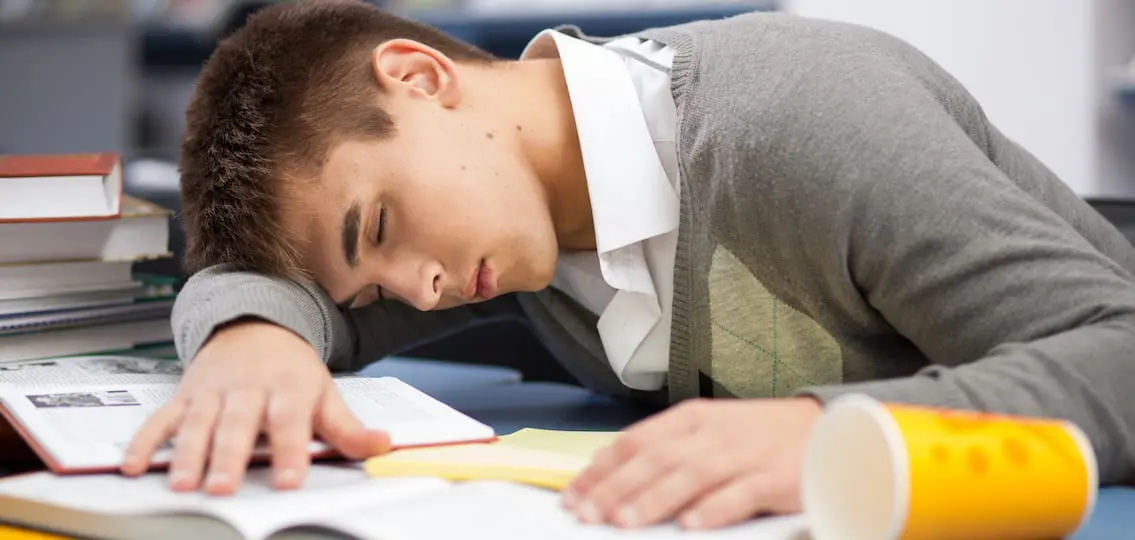Sleepy, grumpy, overtired teenagers are a hallmark of American schools. Does it have to be this way?
Does your teenager find it hard to get up for school in the morning? Is your teen cranky, overtired, perpetually running late, and rushing to get the school day started?

Your teenager is not alone—and it may not be your child’s fault. Consider this: most public school systems in America are operating contrary to the dictates of nature when it comes to teens and sleep.
Sleep is the third pillar of health, along with nutrition and movement, that keeps us healthy and balanced. Yet, as a society, we really undervalue the role of sleep in keeping us healthy.
In my work at St. Jude, I conduct research on sleep and fatigue in children undergoing treatment for cancer and in brain tumor survivors. So much of what we do is very specific to our patient population, but sleep has been my focus since the beginning of my career. And now, as the mother of teenage boys, I am personally interested in how sleep is affecting my own children.
The Science of Sleep

Doing the math highlights the problem: If a teenager isn’t ready to sleep until 11 p.m., and has to be sitting in a desk at school for the first bell by 7 a.m., there just aren’t enough hours in the night to get enough sleep. Night after night, that teen will become chronically sleep-deprived.
Insufficient sleep contributes to making us overweight, sick and sluggish. We literally clean our brains while we sleep, washing away harmful toxins and making room for memories to be stored. In children and teenagers, poor or insufficient sleep is related to poorer organization, poorer memory, and academic difficulties.
And, frighteningly, chronic sleepiness is correlated to higher rates of depression and increased rates of automobile accidents.
Advocating for Later School Starts
It is for all these reasons that the AAP advocates for later school start times. The benefits of doing so aren’t hypothetical. Districts around the U.S. that have delayed school start times, such as in Seattle, Washington; Edina, Minnesota; Cherry Creek, Colorado; and Avonworth, Pennsylvania, have seen great rewards: teens getting more sleep, better grades, improved attendance, higher graduation rates, fewer tardies, less substance abuse, lower rates of depression, and dramatic decreases in automobile accidents.
And although some were worried teens would just stay up later if they could sleep later in the morning, this hasn’t happened. In the end, the teens with later starting schools get more sleep and do better during the day.
Unfortunately, in my own children’s school district in the Memphis area, school starts at 7 a.m., which is excessively early. Our high schools’ start times are among the earliest 10 percent in the United States. Students living the farthest from our local school have to be at the bus stop at 5:50 a.m. This means many must wake up at 5:15. For those who are falling asleep at 10:30 p.m., that is about six hours and 45 minutes of sleep, far less than the 8-10 their bodies need. It also means they’re awake about two-and-a-half or three hours before their brains are fully functional.
I choose to advocate locally on the topic. I’ve spoken before our local school boards and I’ve become a leader in the Start School Later movement around Memphis. I tell our leaders that no high school should start before 8:30 a.m., to accommodate the biology of teenage circadian rhythms. Some local schools have started to experiment with moving to later start times, but unfortunately, my own sons’ school hasn’t made a change yet.
So before you get frustrated or angry with your teen for going to bed too late, for hitting the snooze button too many times in the morning, or for sleeping in on the weekends, know that biology has a huge role in their sleep patterns.
Think about what kind of growing their young body is doing—remember, those circadian rhythms have great power—and consider advocating for healthy school start times in your own community.

Our schools follow CDC guidelines and AAP recommendations for everything from vaccination schedules to hand washing and all the other things that are really important for health. But they aren’t following the guidelines for later school start times. We must do better about understanding the importance of sleep for our health, and it should start with our education system.
You can find a local chapter of the Start School Later movement at https://www.startschoollater.net/





